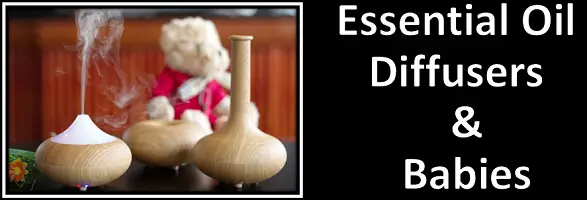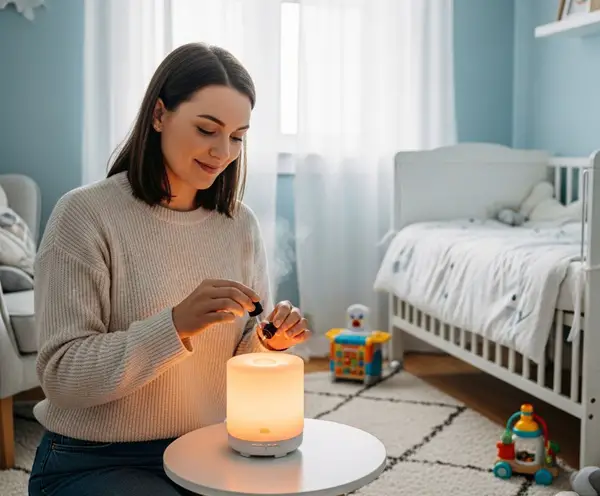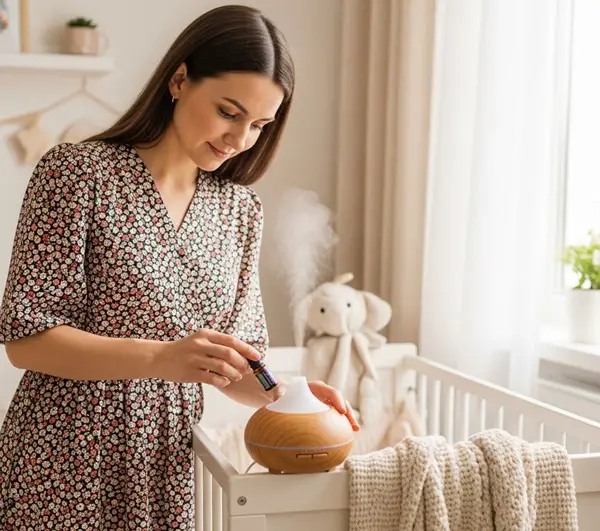
Essential oils have become a popular alternative health treatment for adults across the globe, but are they safe for your babies?
As parents, we all know that protecting our babies is our most important priority. But many of us may still wonder if the essential oils that work for us are also safe for our baby.
The answer isn’t quite so simple. But in short…
Diffusing essential oils into the air is considered a much safer option than using them directly on your baby’s skin. But since these oils do not come without risks, they can be irritating for some; you should avoid using them around infants under 6 months old.
Below, we’ll take a detailed look at how essential oils can affect your baby. In doing so, we’ll also determine which practices are safer for newborns.
Keep this information in mind as you look to make sure that both you and your baby are as healthy as possible.
Are Essential Oil Diffusers Safe for Babies?
Keep in mind that essential oil diffusers are available in various varieties, and they aren’t a “one-size-fits-all” type of ordeal.
For babies, ultrasonic and nebulizing diffusers are generally the safest options. They disperse essential oils as a fine mist, which is less likely to irritate sensitive airways.
Avoid using heat diffusers, as they can alter the oil’s natural properties and may release harmful fumes.
A few important points you need to keep in mind while using essential oils and oil diffusers around your baby are:
- Do not ever try to use them internally or for ingestion.
- Start with a very low concentration—usually 1–2 drops of essential oil diluted in plenty of water.
- Make sure the diffuser is placed out of reach and never directly next to your baby’s sleeping or play area.
- Read the instructions and safety tips provided by the manufacturer before using your diffuser.
- Always consult your pediatrician before introducing essential oils, especially for infants under 6 months.
How long should you diffuse essential oils around your baby? Can you diffuse oils overnight?
Generally speaking, you won’t want to expose your baby to high concentrations of essential oils. Smaller concentrations prove healthier and more beneficial to protecting children against various diseases.
For this reason, it’s best to limit the amount of time you’re running a diffuser. This means avoid diffusing oils overnight. Instead, limit diffuser use to short sessions of about 15 to 30 minutes at a time and always keep an eye on how your baby reacts during and after diffusion.
This will help cut down on the essential oil concentration in the air, as well as allow you to protect your baby in case of an emergency.
Alternatives if you do not want to use diffusers around your baby…
If you prefer not to use a diffuser around your baby, there are still safe and gentle ways to enjoy the benefits of essential oils, because you never know if your baby is being irritated.
One simple method is to place a drop of essential oil on a cotton ball and keep it nearby, out of your baby’s reach. This allows the aroma to disperse subtly into the air without overwhelming their sensitive system.
Another safe option is wearing an aromatherapy necklace, which gives you personal exposure to the scent while minimizing your baby’s direct contact. These methods help you enjoy calming or uplifting aromas without creating a high concentration in the room.

What Essential Oils are Safe to Use Around Babies?
Remember when we said that not all essential oils are safe to use around babies?
Well, we’ve put together a list of a few that are.
Experts suggest that using these essential oils can boost your baby’s health and prevent the development of the disease.
1. Lavender
Lavender is widely known for its calming and sleep-promoting properties. So, you can diffuse it during your baby’s bedtime routine to help them relax and sleep more peacefully.
For topical use (only when recommended by a pediatrician), dilute it heavily with a carrier oil like olive oil and gently apply a small amount to the baby’s scalp or soles of the feet. Always patch test first.
2. Lemon
Lemon essential oil is refreshing and has natural antibacterial properties. It may also help ease mild respiratory symptoms in babies.
To use this around the baby, diffuse a drop or two in the morning for a clean, uplifting scent. Avoid topical use of lemon oil on babies, especially before sun exposure, as citrus oils can make skin sensitive to light.
3. Geranium
This floral essential oil is known for its calming and balancing effects, which are especially helpful during bedtime.
You can diffuse it in small amounts before naps or at night to help your baby settle down. Its gentle aroma can make bedtime routines more peaceful.
4. German Chamomile
German Chamomile is another best essential oils for your baby to diffuse around them, known for its soothing and anti-inflammatory properties.
Add a drop to bathwater (pre-diluted in a carrier oil) or diffuse gently in the room before bedtime. Its soft, sweet scent can ease tension, calm fussy babies, and support relaxation.
5. Tea Tree
Tea tree oil is known for its powerful antimicrobial, antifungal, and disinfectant properties. It can be helpful for things like diaper rash or mild fungal infections when diluted properly in a gentle, unscented carrier oil.
For diffusing, you can use it in a nebulizing or ultrasonic diffuser, but only in very small amounts and never around babies under 6 months old.
Personally, I keep tea tree oil in my toolkit, but I use it very sparingly—and only when absolutely needed. Safety always comes first with little ones!
What Essential Oils Should You Avoid Near Infants?
Oils like wintergreen, eucalyptus, rosemary, and peppermint are known to be too harsh. They can trigger breathing difficulties, skin irritation, or allergic reactions, even when diffused. So, it’s recommended to avoid diffusing these strong oils for a baby’s delicate system.

Factors to Consider When Buying Essential Oil Diffusers for Babies
Overwhelmed by options? Feeling like you need a PhD to pick a diffuser?
Relax. I’ve been there—googling through sleepy eyes at 2 a.m., trying to figure out what’s safe, what’s hype, and what won’t turn my nursery into a foggy rainforest.
Here’s a simple, parent-tested guide to help you make the right call without losing your mind (or your money).
1- Dimmable Lights
Some diffusers come with soft, glowing lights. Sounds cute, right?
Well… until you realize that your baby now thinks it’s a disco party every time you try to put them to bed. Trust me, nothing says “not tonight, mama” like flashing LEDs.
Pro tip: Get a diffuser with adjustable or optional lighting. That way, you can set the mood for play or sleep, and save yourself from another midnight light show.
2- Good Coverage
Here’s the deal: essential oils are powerful (especially for tiny lungs), so the last thing you want is a cloud of lavender misting directly into your baby’s crib like it’s fogging up a haunted house.
The fix? Choose a diffuser with a wide diffusion range. That way, you can place it safely across the room, and your baby still gets the gentle benefits, without the overwhelming aroma.
Bonus: Wide-range diffusers often double as room fresheners. Say goodbye to that mysterious “diaper corner” smell.
3- Automatic Shutoff
You’re juggling bottles, diapers, and maybe your sanity, so remembering to turn off the diffuser shouldn’t be another thing on your list.
Look for a diffuser with an auto shut-off when the water or oil runs out. Not only does it save the machine, but it keeps things safe.
Because let’s face it—sleep-deprived brains don’t always remember to switch things off.
4- Soothing + Humidifying – A Two-for-One Win
Dry air + baby noses = cranky nights.
A diffuser that also humidifies is a game-changer, especially in winter or AC-heavy summers.
Look for an ultrasonic diffuser that gently adds moisture to the air while delivering those calming oils. It’s like spa night for your baby—minus the cucumber slices.
5. Whisper-Quiet Operation
Some diffusers sound like a spaceship taking off.
That’s fine for sci-fi fans, but not ideal when you’re trying to lull a baby to sleep.
Go for a diffuser that promises “whisper-quiet” or “silent” operation. Trust me, even a faint buzzing can feel like a chainsaw when you’re running on 4 hours of broken sleep.
Final Thoughts
When it comes to your baby, safety and simplicity matter most. A good diffuser should be gentle, quiet, and effective—not a miracle worker, just a helpful tool.
While ultrasonic models are popular, a waterless, plastic-free nebulizing diffuser is often the safest and most effective choice. It delivers pure essential oil mist without heat or dilution—ideal for tiny lungs.
Do a little homework, choose wisely, and you’ll have a soothing, natural way to support your baby’s wellness—and maybe even sneak in a nap yourself.
Meen Smith is a nurse by profession who loves writing online, spending time with her family and caring for the elderly. She has already worked as an associate editor on various moms, babies, home appliances, kitchen, and healthy living blogs. In her spare time, she also enjoys drawing, reading/writing kindle eBooks and improving her skills a bit.
